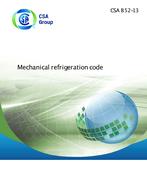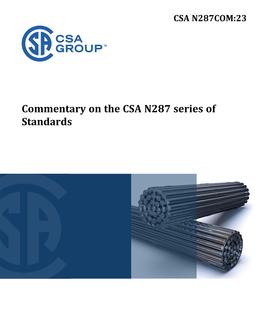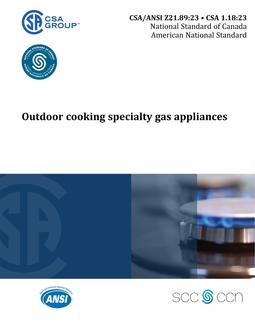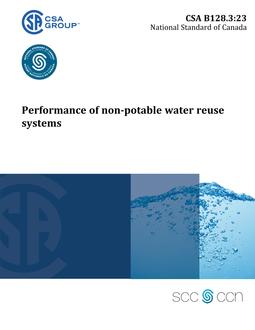
CSA B52-13
- Comments Off on CSA B52-13
- CSA
Preface
This is the eleventh edition of CSA B52, Mechanical refrigeration code. It supersedes the previous editions published in 2005, 1999, 1995, 1992, 1991, 1983, 1977, 1965, 1951, and 1939. The 11th edition of this Standard provides the minimum requirements for the design, construction, installation, inspection, and maintenance of the mechanical refrigeration systems, and is complemented by the practical implementation guidance B52 Handbook, helping to minimize the risk of personal injury. The Code applies to all refrigeration systems installed, whether in new or existing premises, to systems that undergo a substitution of refrigerant, and to parts that are replaced in or added to the system. Changes to this edition include: a) Clause 2 has been has been updated to add the following definitions:
- i) Automated control; ii) Fade-out vessel; iii) Gas cooler; iv) Manual control; v) Pressure-regulating relief valve; vi) Primary refrigerant; vii) Secondary refrigerant; viii) Subcritical; ix) Subcritical system; x) Systems; xi) Supercritical; xii) Thermal relief device (or thermal expansion relief device); xiii) Transcritical system; and xiv) Triple point;
b) Updates to Clause 4.3.1.2.3; c) Updates to Clauses 5.5.1, 5.6, 5.7.1, and 5.8.1, addition of Clause 5.9.2.1(c); d) The addition of a note to Clause 6.3 and an update to Clause 6.3(d); e) Updates to Clauses 7.2.2.1, the addition of Clause 7.2.2.4; f) Updates to Clause 7.2.3 to include
- i) renumbering of Clauses 7.2.3.1.1, 7.2.3.1.2, and 7.2.3.3 of the 2005 edition; and ii) the addition of Clauses 7.2.3.2, 7.2.3.2.1, and 7.2.3.2.2;
g) Updates to Clause 7.2.4,; h) Updates to Table 6; i) The addition of Clause 7.3.6.5; j) Updates to Clauses 8.1, 8.2, 8.3, 8.4.1, 8.4.3, and the addition of Clause 8.4.4; k) Updates to Annex I; l) The addition of Annex J; m) The addition of Annex K; and n) The addition of Annex L. This Standard contains recommendations only and does not have the force of law until adopted officially by a jurisdiction. The regulatory authorities having jurisdiction, including those that have adopted this Standard, should be consulted on the extent of such adoption, as the Standard could have been adopted with exemptions or with additional requirements.
Scope
1.1 Purpose The purpose of this Standard is to minimize the risk of personal injury by providing minimum requirements for the design, construction, installation, inspection, and maintenance of the mechanical refrigeration systems and volatile direct refrigeration systems specified in Clauses 1.2.1 and 1.2.2. Note: This Standard does not directly address protection of property and preservation of the environment. 1.2 Application 1.2.1 Except as specified in Clause 1.2.3, this Standard applies to the design, construction, installation, inspection, and maintenance of every refrigeration system as provided for by the “Act” (as defined in Clause 3) and identified in this Standard. 1.2.2 This Standard applies to a) all refrigeration systems installed subsequent to its adoption. This includes refrigeration systems installed in a new or existing premises. It also applies to all premises, including the machinery room if required, in which a refrigeration system is to be installed; b) refrigeration systems that undergo a substitution of refrigerant in a premises defined in Item (a); and c) those parts of a refrigeration system that are replaced in, or added to, systems installed prior to its adoption. Note: When adding or replacing parts (see Item (c)), consideration should be given to the premises requirements of Item (a). 1.2.3 This Standard does not apply to the following: a) the use of water or air as a refrigerant; b) bulk-storage gas tanks not permanently connected to a refrigeration system; c) refrigeration systems installed on railroad cars, motor vehicles, motor-drawn vehicles, aircraft, or ships; and d) refrigeration systems used for air conditioning in private residences. 1.3 Mandatory language In this Standard, “shall” is used to express a requirement, i.e., a provision that the user is obliged to satisfy in order to comply with the standard; “should” is used to express a recommendation or that which is advised but not required; and “may” is used to express an option or that which is permissible within the limits of the standard. Notes accompanying clauses do not include requirements or alternative requirements; the purpose of a note accompanying a clause is to separate from the text explanatory or informative material. Notes to tables and figures are considered part of the table or figure and may be written as requirements. Annexes are designated normative (mandatory) or informative (nonmandatory) to define their application. 1.4 Units of measurement The values given in SI (metric) units are this Standard. The values given in parentheses are for information only. A list of conversion factors is provided in Annex D. Pressure, unless otherwise stated, is expressed in kilopascals above atmospheric pressure, i.e., gauge pressure.
Product Details
- Edition:
- 11th
- Published:
- 12/01/2013
- ISBN(s):
- 9781771392372
- Number of Pages:
- 106
- File Size:
- 3 files , 2.8 MB
- Product Code(s):
- 2422548, 2423094, 2021362



